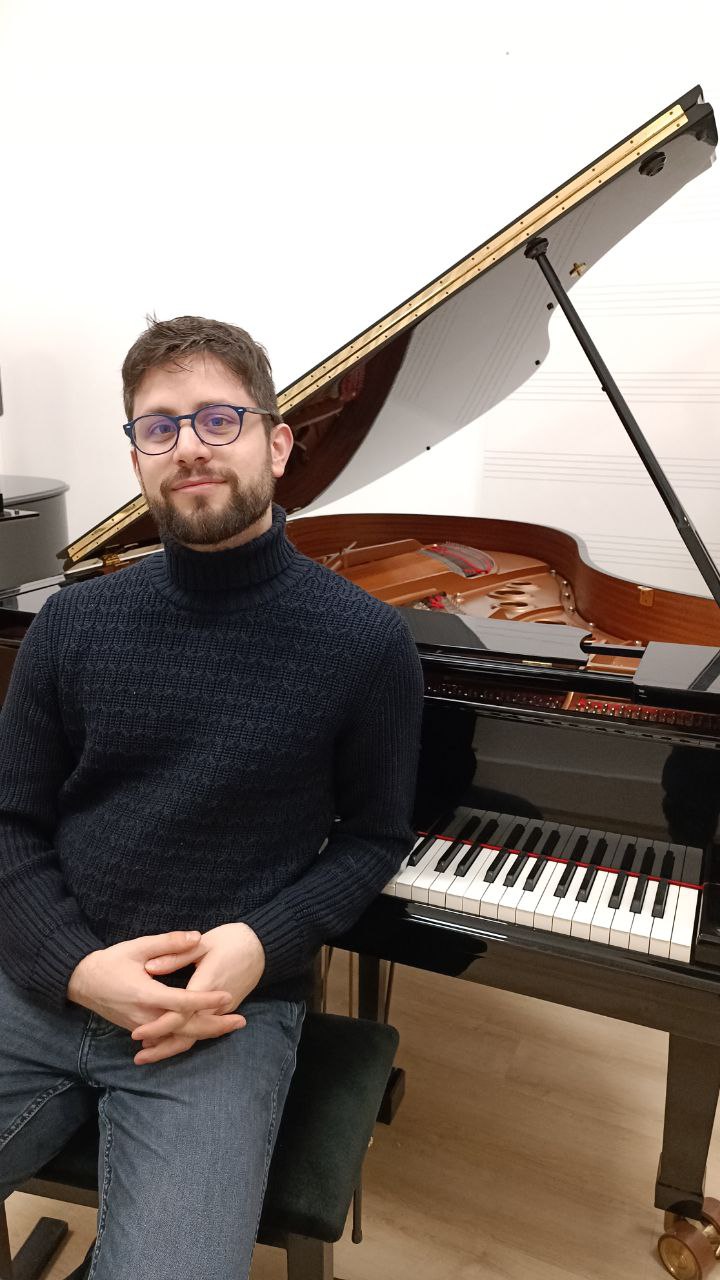Säveltäjä Sergei Rahmaninovin syntymästä tulee maaliskuussa kuluneeksi 150 vuotta. Juhlavuoden kunniaksi pianisti Modesto Picci (Italia) esittää Rahmaninovin pianokonserton nro 3 d-molli op. 30.
Esiintyjät
- solisti Modesto Picci
- 2. piano Samuel Eriksson
Ohjelma
Sergei Rahmaninov (1873-1943) Pianokonsertto nro 3 d-molli op. 30
- Allegro ma non tanto
- Intermezzo: Adagio
- Finale: Alla breve
Sergej Vasil'evic Rachmaninoff: Piano Concerto no. 3 op. 30
No. 3 in D minor op. 30 was composed by Rachmaninoff in 1909 and performed for the first time in New York on November 28 of that same year, played by the author himself and conducted by Walter Damrosch. It is a work of notable formal commitment, in which Rachmaninoff partially abandons certain rhetorical and magniloquent tones to favor a more lyrical and collected effusiveness. This concert is Rachmaninov's longest and the author (who had stopped performing it since the end of the 1930s, considering himself inferior as an interpreter to younger pianists such as Horowitz and Gieseking) had also edited a drastically reduced version, which, however, never had particular success.
The first movement, Allegro ma non tanto, has a calm and contemplative pace and is almost completely entrusted to the soloist, whose silence only occurs in one place: during the bridge played by the orchestra, which unites the first and second themes in the exposition. This last theme is the most seductive of the entire concerto, despite the fact that the development of the Allegro ma non tanto is entirely based on the metamorphosis of the first theme and is barely hinted at in the reprise. The second movement, Intermezzo, Adagio, is a page of purely romantic taste, full of passionate lyricism: towards the end the piano triplets filigree suggest a melancholy waltz in F sharp minor, melodically intoned by the clarinet and the bassoon and accompanied by pizzicato bows. In the third movement, Finale, the thematic cues from the first movement return, this time reworked with great virtuosity; the coda explores further sonorities, first taking up the main theme of the first movement like a macabre dance, and then concluding with an unbridled treatment of the second theme of the Finale itself. -Modesto Picci
Il Concerto n. 3 in re minore op. 30, composto da Rachmaninoff nel 1909, ed eseguito per la prima volta a New York il 28 novembre di quello stesso anno, suonato dall'autore e diretto da Walter Damrosch, è un'opera di notevole impegno formale, in cui Rachmaninoff abbandona parzialmente certi toni retorici e magniloquenti per privilegiare un'effusività più lirica e raccolta. Di questo concerto, che è il più lungo di Rachmaninov, l'autore (che a partire dalla fine degli anni Trenta aveva smesso di eseguirlo ritenendosi inferiore come interprete a pianisti più giovani come Horowitz e Gieseking) aveva curato anche una versione drasticamente ridotta, che però non godette mai di particolare successo.
Il primo movimento, Allegro ma non tanto, ha un andamento tranquillo e contemplativo ed è quasi completamente affidato al solista che tace solo in un luogo, durante il ponte suonato dall'orchestra, che unisce nell'esposizione il primo al secondo tema. Quest'ultimo tema è il più seducente dell'intero concerto, malgrado che lo sviluppo dell'Allegro ma non tanto sia tutto basato su metamorfosi del primo tema e nella ripresa sia appena accennato. Il secondo tempo, Intermezzo, Adagio, è una pagina di gusto schiettamente romantico, ricca di appassionato lirismo: verso la fine le terzine del pianoforte suggeriscono in filigrana un malinconico valzer in fa diesis minore melodicamente intonato dal clarinetto e dal fagotto e accompagnato dal pizzicato degli archi. Nel terzo tempo, Finale, alla breve, ritornano spunti tematici del primo movimento, rielaborati con grande virtuosismo; la coda esplora ulteriori sonorità, dapprima riprendendo il tema principale del primo movimento atteggiato in una sorta di danza macabra, eppoi concludendo con uno sfrenato trattamento del secondo tema del Finale stesso. -Modesto Picci
Modesto Picci (b. 1996)
Modesto Picci, born in 1996, began studying the piano at the age of ten years with Maestro Andrea Musio and graduated with the mention of honor under the guidance of Maestro Pasquale Iannone at the Conservatory N. Piccinni” in Bari where he is currently attending the two-year course of second level. He has participated in various master classes held by masters such as Gàbor Farkas, Andrea Lucchesini, Ronan O’Hora, Jin Ju, Daniel Rivera and Marsida Koni and regularly attends master classes at the ‘Accademia Musicale Pescarese held by Maestro Pasquale Iannone. He has won numerous international competitions including: “XXIV Stefano Marizza” International Piano Competition, Premio Nazionale delle Arti (3° prize), Monegros 88 Keys international Piano competition (Sarinena, Spain), Minerbio International Piano Competition ( Bologna), Competition Antonio Salieri” International Competition for Young Musicians (Legnago), International Piano Competition City of San Donà di Piave” International Piano Competition, International Musical Competition Lucia Iurleo” (San Vito dei Normanni), International Musical Competition Don Matteo Colucci” (Fasano), International Musical Competition Symphonia” International Music Competition (Scorrano), International Music Competition “San Lazzaro Trophy” (Gallipoli). He has held stylistic recitals in many Italian cities such as Venice, Bologna, Barletta, Bari, Naples and Lecce, performing for prestigious festivals such as the Barletta Piano Festival, Camerata musicale Barese, Camerata musicale Salentina, San Giacomo Festival.
He recently played at the “L. D’ Annunzio” Conservatory in Pescara and with cellist Stefano Cerrato at the “N. Piccinni” Conservatory in Bari. Modesto Picci played Nino Rota’ s Piano Concerto in Do with “Orchestra Metropolitana di Bari” conducted by Neil Thomson at the Nino Rota Auditorium in Bari.

Modesto Picci